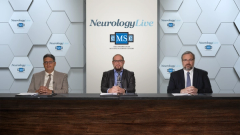
Unmet Needs in Multiple Sclerosis Clinical Trial Design
Ahmed Obeidat, MD, PhD; Benjamin Greenberg, MD; and Hesham Abboud, MD, comment on the need for more inclusive clinical trial patient enrollment criteria, highlighting underserved patient populations.
Episodes in this series

Ahmed Obeidat, MD, PhD: This is a great point and a major unmet need in MS that we can talk about, when we think about those patients they're often left out from clinical trials and then with BTKi, [bruton tyrosine kinase inhibitor] maybe a class of medication we should be using for, what are your thoughts about that?
Benjamin Greenberg, MD: It's not just our patients with more advanced disability. A lot of these trials are excluding a patient if they're over the age of 60 and my practice has a large population of patients that are over the age of 60 and we design trials to answer a question in a scientifically rigorous fashion and not all trials give us the data we need to practice medicine when it's all said and done. And there are lots of opportunities for us to be broader in our inclusion of patients to get closer to a real world clinical scenario of the populations we're going to treat with these drugs, we all advocate for and encourage whenever possible for trials to be designed in that way so that we can get a representative sample of the patients we're going to prescribe to in the future. One of the things that's also interesting about this class, and you were talking about where it would fit in.
Ahmed Obeidat, MD, PhD: It would fit, yes.
Benjamin Greenberg, MD: And how we would prescribe. When you were describing multiple sclerosis at the very beginning of this program, you talked about inflammation and relapses, and then the term I love "neurodegeneration", and it's interesting in multiple sclerosis the explanation of degeneration has changed over time.
Ahmed Obeidat, MD, PhD: It does, yes.
Benjamin Greenberg, MD: We all have to accept we still don't know exactly why and the classic chicken and egg scenario is there some part of the immune system, whether it's the adaptive immune system or meningeal follicles or the native immune system with microglias. Is there an immune-mediated degeneration? Or is there something intrinsic to the neurons of the MS patients or oligodendrocytes of MS patients that set them up for degeneration in the absence of an active immune system, and it's a great way to start a fist fight at a research meeting is to suggest one or the other and see what people think. If, one of the interesting things about the BTK inhibitors is that if either of the explanations, the germinal center, or the microglia, any of the immune-mediated explanations turn out to be correct and one or more of these BTK inhibitors hits an endpoint in progressive disease. Let's imagine a world where one of them doing a relapsed/remitting trial and a progressive trial or multiple progressive trials hits their endpoint across the board, all of a sudden, have a single agent that have shown a benefit in both the relapsed/remitting and some version of the progressive form of the disease. That becomes an outstanding opportunity from a clinical management and treatment perspective, and one of the most interesting questions we're going to have to face as a community is where do we insert this into our armamentarium? Now, the classic arguments I'm hearing or the last years at this meeting is around escalation therapy versus induction therapy, and it's interesting. Our language comes from this notion of efficacy being tied to risk. How much risk would we take up front to try and achieve a broader benefit? But that's all around essentially the adaptive immune system. If we have a drug that works on both the adaptive and the immune system, and it hits its endpoint in the relapsed/remitting and progressive trials, I could make an argument for that to be first-line therapy in even the mildest patient and here's my reasoning, and I'm curious if you agree or disagree. I have plenty of patients who I see who are just newly diagnosed, young, healthy, mild symptoms, low burden of disease and the more time that goes by and the more patients I see, I get convinced that a significant percent of them have some version of "neurodegeneration", I'll use that term broadly, happening that I am clinically unaware of that I'm going to see for 10 or 20 years. And it may show up cognitively, it may show up emotionally, it may show up fatigue, it may show up in all sorts of ways, but it's there and it's happening. And I'm wondering if we had some intervention that worked on multiple aspects of this condition, would we push for it to move to the front of the line? I don't know the answer of that yet and obviously it depends on the clinical trials. But if one of the drugs hit its endpoint in both progressive and in relapsed remitting, would you be tempted to have that conversation with new diagnosis patients in that front incentive?
Hesham Abboud, MD: Absolutely. The way I usually think about it is I always put myself in place of the patient, and I feel like if I know I have a potentially neurodegenerative condition, I would want to start something that can slow down this neurodegeneration as soon as possible, and like you mentioned, we already have studies that show that cognitive impairment or a higher rate of brain atrophy starts early in MS patients even before meeting full diagnostic criteria for MS. Even when they are still in the clinical syndrome phase. If we think that this molecule or any other future molecules can slow down this neurodegenerative component and not just act on the inflammatory part of the disease, I would be tempted to start it as early as possible.
Ahmed Obeidat, MD, PhD: And one of these eye-opening studies for me was the study that looked at the brain rate of brain atrophy that is more pronounced in the younger population with MS, they're faster rate of degeneration, which is eye-opening, and that speaks to the point both of you made is starting those medication maybe early on in the treatment algorithm, we can target both if it is true that they're going to work in both situations in both types of pathology. This is a great insight into this group of medication and maybe into where to place them in the future.
Trancsript Edited for Clarity
Newsletter
Keep your finger on the pulse of neurology—subscribe to NeurologyLive for expert interviews, new data, and breakthrough treatment updates.














